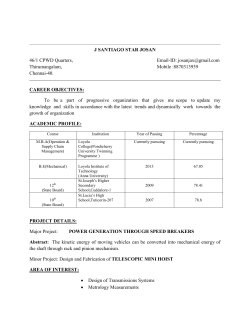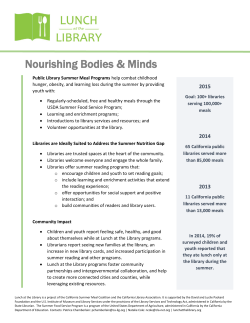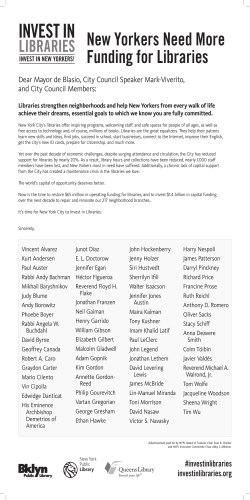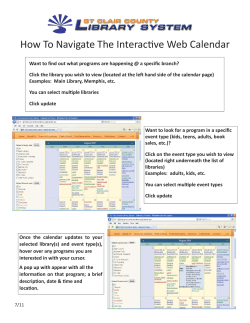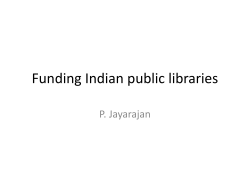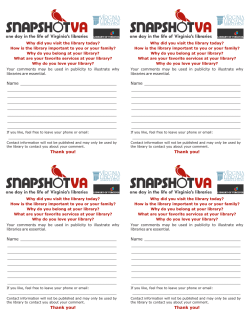
Shelf Life: Spring 2015 - Loyola University Chicago Libraries
SHELF LIFE N E W S F O R F A C U LT Y & F R I E N D S • S P R I N G 2 0 15 LOYOLA UNIVERSITY CHICAGO LIBRARIES A new tool for discovery By Anne Reuland, Assistant Dean for Technical Services and Planning We are delighted to report that the University Libraries will launch a new, state-of-the-art online library system in late July 2015, to be fully ready for fall 2015. We are sure you will find the new library search tool to be powerful but easy to use, allowing precise searching as well as broad searching that can be conveniently narrowed to target the material desired. The system will cover our traditional library catalog database as well as other pools of research material such as collections of online journal articles, streaming video, the eCommons institutional repository, unique Loyola University and Mundelein College digitized special collections, and more. Connecting to online resources through the system will be easier than ever, and our print collections will still be fully described as they are in our current catalog. The new system will succeed our Pegasus catalog, a reliable tool but, at over 15 years old, no longer the standard for online library service. After a careful assessment of the most forward-looking library software on the market, the Libraries chose an excellent system (Ex Libris’ Primo) that is successfully used by a number of other universities. Primo is the same engine behind NUSearch at Northwestern, Hollis+ at Harvard, Holmes One Search at Boston College, and MNCat Discovery at the University of Minnesota. It is in use at over 2,000 academic and research libraries worldwide, and offers many customization options to allow each library to suit its own user community and collection. The new library search tool will be backed up by a new system for library collection management including reserve readings and requesting library materials. Library users will have access to these familiar services through new search screens. Behind the scenes, the new system will further automate some routines to allow skilled staff members to focus on more challenging aspects of cataloging, purchasing, and linking to electronic collections. Post-launch, the Libraries will consult library users and conduct usability studies to help us continuously customize to improve the service. The Libraries’ strategic plan is headed by a goal to “open new paths for discovery and delivery of scholarly material in all formats and from many sources, including our own print and online collections of published scholarship, unique special collections and archives, and scholarly collections available through library cooperatives, open repositories, and other external collections.” The new system will be a major achievement in this direction and one of the most important steps the Libraries can take to realize our vision, To be Loyola’s gateway to the world of information and scholarship! GREETINGS FROM THE DEAN D E A R F R I E N D S A N D CO L L E AG U E S , Welcome to the spring 2015 edition of the University Libraries Newsletter. We are pleased to bring you up-to-date on events and activities in Loyola’s libraries. We had a very busy fall semester in 2014 with a number of notable achievements and programs. After a nice holiday break, we are now well into the new semester and staff are focused on a number of important activities. The most notable of these is the six-month implementation of a new automated library system, the software which handles the functions critical to library operations and provides access to our myriad of print and electronic resources. The new system, Alma, was made possible in large part by significant funding from the University administration as well as financial support from Information Technology Services and the Libraries’ own budget. As the first new library computer system at Loyola in 15 years, the project is described in detail in this issue. Our fall programs included a standing-room-only reading by award-winning author and Loyola alum, Stuart Dybek in September; a program to welcome a gift of two rare Torah scrolls in October; and our second Focus on the Book lecture in December given by Mark Dimunation, Chief of the Rare Book and Special Collections Division at the Library of Congress. Open Access Week in October featured a keynote by Ed Valauskas, editor and publisher of First Monday, an online open access journal on internet research. The week also included our annual Celebration of Faculty Scholarship featuring 436 works by 233 Loyola professors. As you can see, the University Libraries continue to provide a wide variety of fascinating and thought-provoking programs. The library family began the New Year on a very sad note as we lost long-time staff member and friend, Brenda Overton. Brenda was a loyal reference department employee who in recent years played a key role in co-chairing our staff development committee. A memorial service was held in the library on February 9th. I wish all our readers a happy and enjoyable spring 2015 and hope to see many of you at our April program on political cartooning. Sincerely, Robert A. Seal Dean of University Libraries SHELF LIFE Robert A. Seal Dean Gabrielle Annala Laura Berfield Public Relations Committee Co-Chairs Brian Harag Sarah Meisch Copy Editors Laura Berfield Layout Shelf Life is produced twice a year for faculty and Friends by the University Libraries, Loyola University Chicago, 1032 West Sheridan Road, Chicago, IL 60660. Questions or comments may be directed to [email protected]. Back issues of the newsletter are available at libraries.LUC.edu. 2 • UNIVERSIT Y L IBR A R IES Avoiding predatory publishers By Fred Barnhart, Associate Dean for Library Services and Collections Most academic scholars have heard about predatory publishing, but may not know what it is or how to avoid it. The term “predatory publisher” was coined by Jeffrey Beall, a librarian at University of Colorado, Denver, to describe a practice he noticed becoming more prevalent; publishers exploiting authors and researchers by charging a fee for inclusion in online journals without peer review or even copy-editing. Publish or perish is nothing new, but in more recent years with the increase in post-doc authors and fierce competition for tenure track positions, new faculty or post-docs are eager to be published making them prime targets for publishers who offer quick publication in seemingly reputable journals. Oftentimes the publishers will reach out directly to the author, promising rapid acceptance and publication process in an open access journal with a title that suggests international reach and high impact across disciplines. However, in this day and age when anyone with internet access can become a publisher it usually is too good to be true. Not only may the unsuspecting author be surprised with an invoice for as yet unmentioned “publishing fees,” but the article may receive little if any peer review and some journals have been known to disappear without leaving any archive. Publishing in a predatory journal may be damaging to an author’s scholarly reputation not to mention Diversity Committee By Jennifer Jacobs, Director of Administrative Services The Libraries’ new Diversity Committee aims to foster an inclusive environment, improve services for our diverse student body, and promote learning on issues of diversity, social justice, and global awareness. We welcome suggestions and partnerships with interested faculty, staff, and student groups. For more information, please contact Jennifer Jacobs at [email protected] or James Conley at [email protected]. the reputation of the author’s department or institution. Many of these questionable journals may contain pseudo-science and plagiarized work, causing damage to the sciences and other disciplines that rely on the scholarly record to build knowledge. Not that all open access journals are predatory. There are many reputable open access journals that have successfully shifted the cost of publication to the author instead of the subscriber, creating greater access to important knowledge. Public Library of Science (PLOS) is one of those publishers. It has a great reputation and is raising the bar for high quality open access publications. Open Access publishing has been applauded by librarians and researchers for nearly a decade as it counters the everinflating subscription fees and provides greater access to scholarship outside the traditional academic institution. Also, many government agencies recognize the value of open access publishing and now require that grant funded research be made available to the public either immediately upon publication, or after a brief embargo period, through either a disciplinary repository like PubMed, or institutional repository such as Loyola’s eCommons. The bottom line is Author Beware! How can you avoid being preyed upon? (1) Know the top journals in your field, and if you are not fa- miliar with them, reach out to senior faculty to learn what they consider to be the top journals. Chances are if you or they have not heard of a journal, you should proceed with caution. (2) Review previous issues of the journal and ask yourself whether you want your article to be in their company. Key things to look for include copy-editing and quality of scholarship. (3) Check for transparency in the peer review process and the editorial board. If you cannot find information about either, you should ask the publishers for more information and follow up with the editorial board. (4) Check Beall’s List, which, while not definitive, can help give you some guidance about what may be questionable about an online journal. If you are interested in learning more about predatory publishing and open access publishing in general, please see the following resources: • Open Access Research Guide at libguides.LUC.edu/openaccess • Jeff Beall’s list of predatory publishers at scholarlyoa.com/publishers • Public Library of Science at plos.org • PubMed at pubmed.org • Loyola’s eCommons at ecommons.LUC.edu Congratulations, Dean Seal! The staff of the Loyola University Libraries proudly congratulates Dean Robert A. Seal for receiving the 2015 ACRL Academic/ Research Librarian of the Year. For more details about the Association of College and Research Libraries (ACRL), the award, and Bob’s accomplishments, please visit conta.cc/17v5MlC. LOYO L A U N I V E R S IT Y C HIC AGO • 3 Survivors share their stories Open Access By Paul Voelker, Director, Information Commons By Margaret Heller, Digital Services Librarian Over the past year, the University Libraries have partnered with Loyola’s Department of History to present and preserve a number of special programs featuring survivors of the Holocaust and the 1994 Genocide in Rwanda. The idea for these programs originated in discussions between Dr. Elliot Lefkovitz, an adjunct professor of history, and Dr. Robert Bucholz, Chair of the History Department. Each fall Dr. Lefkovitz teaches a course called, The Holocaust and 20th Century Genocide. He always invites survivors of the Holocaust and other 20th century genocides to speak with his classes. Dr. Lefkovitz and Dr. Bucholz felt it was important to make the historical testimony of Holocaust and genocide survivors accessible to the broader Loyola community. With their busy schedules, students do not always have the opportunity to take advantage of Loyola’s many liberal arts courses that address broad ethical and social justice concerns. The University Libraries’ Learning Commons Committee seeks to support Loyola’s liberal arts curriculum and commitment to social justice by working with departments to offer programming on these topics outside of the classroom, and to preserve these valuable programs on video, so they may be readily accessible as part of the Libraries’ unique local collections. When Dr. Bucholz approached University Libraries Dean, Robert Seal, about filming the events and presenting them to a larger audience, a natural partnership was formed between the History Department and the Libraries. The planning committee for the events included Dr. Lefkovitz, Dr. Paul Voelker, Director of the Information Commons, and Ms. Patti Ray, Director Emerita of Hillel Loyola. All of the programs, held during the fall 2013 and fall 2014 semesters, packed the fourth floor of the Information Commons with Loyola students, faculty, and staff. During these events, seven survivors discussed their diverse experiences as Jews in Denmark, Germany, Hungary, and Poland during the Holocaust. They included recollections of Kristallnacht, the Night of Broken Glass, in November 1938, time in notorious concentration camps like Auschwitz, Mauthausen, and Theresienstadt, and the liberation of the camps by Allied forces in 1945. Jean Claude Mugenzi, a survivor of the 1994 Genocide in Rwanda, also spoke about his experiences in an event commemorating the 20th anniversary of that event. The historical testimony of these survivors has been preserved on video, and all of these videos are available for viewing as part of the University Libraries’ Programs and Events on the Loyola Media website. Search libraries at media.LUC.edu. Each October the Libraries put on a week of programming to celebrate and educate about all things Open Access. Our keynote address was delivered by Edward Valauskas, the founder of First Monday, one of the first open access journals. We then had the largest ever Celebration of Faculty Scholarship, showcasing work from 2013. The theme of publishing continued with a panel on open access publishing, in which faculty and graduate students shared their own experiences, including a new journal edited by Loyola graduate students and co-sponsored by the Libraries. We finished with a workshop teaching students how to edit Wikipedia articles. 4 • UNIVERSIT Y L IBR A R IES Women & Leadership Archives By Nancy Freeman, Director, Women and Leadership Archives Blogging Away at the WLA The Women and Leadership Archives (WLA) now has a blog, which can be found at blogs.lib.LUC.edu/wla. Director Nancy Freeman wrote the inaugural post, and she and WLA Graduate Assistants are contributing on a rotating basis. The purpose of the blog is to highlight collections and activities, in addition to discussion of archival issues and concerns. Posts often have a light-hearted tone. An example is Graduate Assistant Mollie Fullerton’s recent post in which she explains her fascination with disasters and how that relates to her WLA task of revising a Lewis Library disaster plan. History Fair Students Flock to the WLA While the word “flock” may be a slight exaggeration, the WLA has been visited by four middle school/high school students as they work on their 2014–2015 History Fair projects. In addition, the WLA provided reference services via e-mail to three other students. A WLA long-term focus is to increase use by History Fair students. Thus, providing assistance to seven students is an excellent first step. The purpose of History Fair is for participants to conduct historical research using primary sources around a theme, which for 2014–2015 is Leadership and Legacy in History. Students compete first on the local level, through the Chicago Metro History Fair, and can move on to the state and then the finals in Washington, DC. The WLA hopes to build on this year’s success and increase History Fair student use of the Archives. March is Women’s History Month One could say the WLA is designed to celebrate Women’s History Month. This year, each week a different collection will be showcased online and for those who are on or visit Lake Shore Campus, a table top display in Cudahy Library will highlight several WLA collections. In addition, several events by the WLA and the Gannon Center for Women and Leadership will focus on Mundelein College’s involvement in a Freedom March from Selma to Montgomery, Alabama, in March 1965. (The WLA holds the records of Mundelein College, an all-women’s Catholic college that operated from 1930–1991 before affiliating with nearby Loyola.) See the WLA website LUC.edu/wla for details on the Mundelein-Selma events, specifically those on March 12th and 25th. University Archives events & collections By Kathy Young, University Archivist & Curator of Rare Books Yochanan Nathan holds up a piece of parchment during the October 30th Torah program Torah Program On October 30, 2014, the University Libraries and the Loyola Archives & Special Collections were pleased to host a program welcoming two Torah scrolls to Special Collections, the gift of Dr. Martin Johnson. Seventy-five people attended the program which featured a presentation by Dr. Devorah Schoenfeld of the theology department on the meaning of Torahs in Jewish life and culture. The highlight of the program was a presentation by Sofer Stam (Torah Scribe) Yochanan Nathan on how Torahs are created. Mr. Nathan’s presentation was interesting and informative and covered all aspects of writing a Torah from the preparation of the materials to the actual writing of the Torah. The Loyola Archives & Special Collections staff would like to thank Dr. Devorah Schoenfeld (Department of Theology), Dr. Wiley Feinstein (Department of Modern Languages and Literatures), and Patti Ray (former Director of Hillel) for their advice and assistance in planning this program. Rare Book Collection During the past several months new books have been purchased for the Rare Book Collection. Among the titles added to the collection are the Women Citizen’s Library (1913)—a systematic course of reading for women in preparation for suffrage; the Report on Transportation Subways (1909) of Chicago, which provides detailed maps of Chicago streets, sewer systems, and proposed subway lines; the Critical History of England by John Oldmixon (1726); and the Lives of Robert Mortimer, Earl of March and of Robert, Earl of Oxford… by John Oldmixon (1711). Other recent additions include Dresses and Decorations of the Middle Ages by Henry Shaw (1843), published by William Pickering and printed by Charles A. Whittingham at Chiswick, and the Relation of Virginia 1609 by Henry Spelman, printed at the Chiswick Press. Archival Collections Two new archival collections have recently arrived at the department. The first is the papers of M. Margaret McDonnell, RSCJ, which contain the records of the Center for Ethics and Advocacy in Healthcare, founded by Sr. Peggy. This collection expands our holdings in the area of bio-medical ethics as it joins the papers of Richard McCormick, S.J., and Fr. Kevin O’Rourke. The second new arrival is the records of Jack Mulqueen Productions. This collection reflects Mr. Mulqueen’s work in Chicago children’s television during the 1960s and 1970s. Mr. Mulqueen and his wife were responsible for such programs as The Mulqueens and Kiddie-a-go-go. Title page: Dresses and Deocrations of the Middle Ages by Henry Shaw (1843) Digitization Update Archives staff continue to work on creating digital collections from our holdings. Two collections recently added include the Stritch Annual Award programs (content.library.luc.edu/cdm/landingpage/collection/coll51), which contain information on Sword of Loyola and Stritch Medal winners, and the Columbian Exposition (content.library.luc.edu/cdm/landingpage/collection/coll49), which includes materials from archival collections as well as items from the rare book collection. In addition, archives staff continue to add issues to the Loyola News/Loyola Phoenix collection (content. library.luc.edu/cdm/landingpage/collection/coll16), the most recent being the Loyola News issues from 1962 to 1965. In Memoriam Brenda Overton Brenda Overton worked in the University Libraries for over 25 years, first in the Science Library and later in Cudahy Library, where she worked at the Reference Desk and supervised student employees. Brenda was dedicated to helping members of the Loyola community in any way she could, often going beyond the responsibilities of her job. She also served as a mentor to many students, and their dedication to her is apparent in the long running relationships she built with her former students. Brenda is a graduate of the Institute of Pastoral Studies (MA ‘11), and she was active in the prison ministry activities of Reba Place Church in Evanston. We will miss Brenda’s strong commitment to social justice, as well as her humor and kindness. -Niamh McGuigan LOYO L A U N I V E R SIT Y C HIC AGO • 5 non < The required reading list By Professor Sherrie Weller, MFA, Writing Program Director, Writing and Core Literature Faculty, Department of English Beautiful Souls: The Courage and Conscience of Ordinary People in Extraordinary Times by Eyal Press – Press’ narrative collection investigates four scenarios that span different eras, countries, and conflicts, including research from historians, neuroscientists, and moral psychologists, in order to explore how in the face of authority, convention, loyalty, and social pressure, people make extraordinary moral choices, opting for conscience over conformity. These dramatic and bold acts of dissent inherently leave the reader asking, “Would I have the strength and compassion to make this same choice?” An interesting and powerful investigation of Ignatian values in action. Dear Committee Members: A Novel by Julie Schumacher – I loved the epistolary novel from the minute I read Richardson’s Pamela in an undergraduate literature class. Now, decades later, I adore this new novel written solely in quirky letters of recommendation penned by Jason Fitger, a curmudgeonly creative writing and literature faculty member, whose correspondence had me laughing out loud, but also thinking quite critically about the state of academe in a quickly changing era. Why Be Happy When You Can Be Normal? by Jeanette Winterson – Winterson, known by many for her seminal work Oranges Are Not the Only Fruit, wrote this incredibly literary, insightful, and moving memoir about her complicated relationship with her adoptive mother, her search for her birthmother, and the evolution of her sense of identity. What sustains her throughout the sometimes harrowing experience is her relationship with literature, and how, in her perspective, it both literally and metaphorically saves her life, heart, and mind. Untamed State by Roxane Gay – Gay’s collection of essays, Bad Feminist, has recently garnered critical acclaim, but her first novel deserves just as much adulation. It is the darkly poetic and gripping tale of Mireille Duval Jameson, an American-born daughter of a wealthy Haitian, who is kidnapped outside her family’s home in Port-Au-Prince. Evoking a fairy tale like ethos from the start, the story unfurls in a very un-fairy tale like way. On the first page Mireille states, “I was kidnapped by a gang of fearless yet terrified young men with so much impossible hope beating inside their bodies it burned their very skin. . . . They held me captive for 13 days.” And after that, I could not step away from Gay’s voice on the page or Mireille’s journey through unimaginable trauma and pain to her rescue and redemption, largely by her own doing. The Sixth Extinction: An Unnatural History by Elizabeth Kolbert – While you might not think an exploration of how we human beings are bringing about the next big extinction (including our own) would be an engrossing, riveting, adventurous, and, at times, humorous read, that’s exactly what this is. Kolbert deftly and poetically blends research, personal narrative, environmental science, and history in an incredibly thoughtprovoking way. Admittedly, I’m more ‘Arts’ than ‘Science’, but I couldn’t put this book down. Mark Dimunation and Thomas Jefferson enlighten Focus on the Book By Nicole Brodsky, Assistant to the Dean for Programming & Outreach History buffs and rare book lovers gathered on December 3, 2014 for the second annual Focus on the Book: A Lecture by and for Bibliophiles. This season’s program featured Mark Dimunation, Chief of the Rare Book and Special Collections Division at the Library of Congress, home to North America’s largest collection of rare books. A specialist in 18th and 19th century English and American printing, Mr. Dimunation also serves on the faculty of the Rare Book School at the University of Virginia and of The Catholic University of America and is a member of the Grolier Club and of the American Antiquarian Society. The evening in Corboy Law Center’s Kasbeer Hall on the Water Tower Campus began with a reception, followed by Robert Seal, Dean of University Libraries at Loyola, and Dr. David Spadafora, President of the Newberry Library, welcoming guests to the event co-sponsored by their institutions. Dr. Robert Bucholz, President of the Friends of the Loyola University Chicago Libraries, then introduced our esteemed speaker. Mr. Dimunation’s presentation, Jefferson’s Enlightenment: Reconstructing Thomas Jefferson’s Library at the Library of Congress, focused on the Library of Congress’ historic undertaking to rebuild Jefferson’s Library, originally offered for sale by Thomas Jefferson to Congress after the Capitol and Library of Congress were burned by the British in 1814 during the War of 1812. At the time, Jefferson’s collection of books was the largest person6 • UNIVERSIT Y L IBR A R IES ally held in the United States, and Congress purchased his 6,487 volumes in 1815 for $23,950. A second fire in 1851 destroyed almost two thirds of that collection. Remarkably, the project to reconstruct Jefferson’s extensive library nears completion, and we are honored to have had Mr. Dimunation join us in sharing these pages from the extraordinary story of the Library of Congress and of Founding Father, President, and passionate bibliophile, Thomas Jefferson. To view a video of the program and photos from the evening, please visit blogs.lib.LUC.edu/friends. John Donoghue brings pirate’s gold to the Friends Speaker Series By Nicole Brodsky, Assistant to the Dean for Programming & Outreach Could history’s real-life pirates be even more captivating than Captain Jack Sparrow? Loyola’s own Associate Professor of History John Donoghue proved it to be so on February 12 when he presented Rough Justice under the Jolly Roger: Pirates of the Caribbean and the Court of “King Death” to a maximum capacity crowd at the Klarchek Information Commons. This fascinating, fun 2015 kick-off Robert Bucholz, Robert Seal, and John Donoghue to the Friends of the Loyola Libraries Speaker Series began with a festive reception for alumni and Friends, graciously sponsored by Alumni Relations. Dean of University Libraries Robert Seal and Friends President and History Department Professor and Chair Robert Bucholz then greeted guests and introduced Dr. Donoghue. In the words of our speaker, While pirates, the iconic outlaws of the silver screen, have long sustained the American dream of living dangerously, the real history of piracy reveals something even more intriguing—that far from losing themselves in a life of lawlessness, pirates created an alternative system of law and order, what they called “the government of the ship,” to deliver rough and ready justice to the enemies of all “men of spirit.” Among the surprise highlights of the evening was the performance by Drs. Donoghue and Bucholz and doctoral candidate Erin Feichtinger of a historical pirate play. A book signing followed the program. John Donoghue, PhD, is the author of Fire under the Ashes: An Atlantic History of the English Revolution and is now at work on his second book, The Life and Times of Captain Morgan: Piracy, Capitalism, and the Birth of Britain’s Atlantic Empire. We look forward to welcoming Dr. Donoghue back upon its completion. To view a video of the program and photos from the evening, please visit blogs.lib. LUC.edu/speakerseries. New electronic resources By Will Kent, Reference & Electronic Resources Librarian We are always acquiring new resources at the library. Here are four of our newest acquisitions for you to check out. If you have recommendations for new resources, never hesitate to let us know. Please contact Will Kent at [email protected]. The Samuel Beckett Project brings together digital copies of documents that are now preserved in different holding libraries around the world. This resource adds transcriptions of Beckett’s manuscripts, tools for bilingual and genetic version comparison, and an easy-to-use search interface. This resource would be an asset to the English and digital humanities departments. The Loeb Classical Library presents an interconnected, searchable, growing, virtual library of all that is important in Greek and Latin literature. Users will find epic and lyric poetry; tragedy and comedy; history, travel, philosophy, and oratory; the great medical writers and mathematicians; and other Greek and Latin Classical texts with English translations. Anyone in classical studies will put this resource to good use. Advanced Materials is a peer-reviewed journal that offers articles, product, and industry news for materials for chemistry and engineering professionals. Content focuses on research, design, manufacturing, use, and economic information. Chemistry faculty will find this resource very useful. Oxford Biblical Studies contains nineteen Bible texts, the deuterocanonical collections, concordances, and the Oxford Bible Commentary. There are over 6,000 A-Z entries and chapters from Oxford references, including images and maps of the biblical world. Are you researching theology? This resource could be just what you need! LOYO L A U N I V E R S IT Y C HIC AGO • 7 Coming in April... The Great Cartoon Debate Artists at odds: Left, right and completely off-center Wednesday, April 15 7:30 p.m. Kasbeer Hall, 15th Floor Corboy Law Center Water Tower Campus Loyola University Chicago 25 East Pearson Street FREE! Registration required at David Fitzsimmons Arizona Daily Star Scott Stantis LUC.edu/cartoondebate Chicago Tribune Moderated by Don Wycliff, former Chicago Tribune public editor and Loyola School of Communication faculty PRESENTED BY THE LOYOLA SCHOOL OF COMMUNICATION, FRIENDS OF THE LOYOLA LIBRARIES, AND THE CHICAGO TRIBUNE University Libraries 1032 West Sheridan Road Chicago, Illinois 60660
© Copyright 2026

